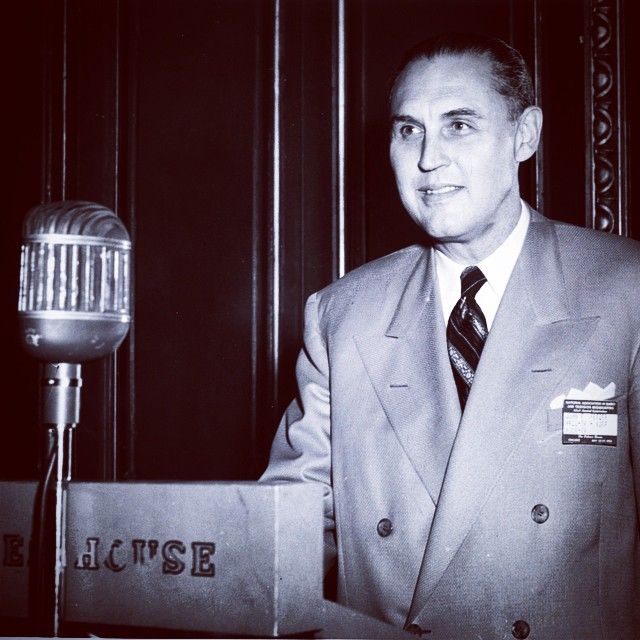Get Today in Masonic History into your Inbox. Sign up today for one of our email lists!
Need an article for your Trestleboard/Newsletter see our Use Policy
John Earl Fetzer is Born

Today in Masonic History John Earl Fetzer is born in 1901.
John Earl Fetzer was an American businessman.
Fetzer was born on March 25th, 1901 in Decatur, Indiana. His father passed away when he was 2. After his mother moved the family to Lafayette, Indiana. In Lafayette, Fetzer's brother-in-law, a telegraph operator for Wabash Railroad, taught him about wireless communication. The two often get updates about the Detroit Tigers over the telegraph.
In 1917, when radio was still in it's infancy, Fetzer had embraced the new medium. He built a transmitter-receiver and began communication with a man in Pittsburgh, Pennsylvania.
In 1923, Fetzer moved to Berrien Springs, Michigan to help setup a radio station at Andrews University. There he met his wife and the two were married sometime around 1926. After their marriage Fetzer traveled to Europe to study radio operations there. He was repulsed by what he discovered, government agencies were in total control of radio around Europe and Fetzer did not want to see it happen in the United States. He returned to the United States at the beginning of the Great Depression. The radio station he had set up for Andrews University had become too much of an expense and the school offered to sell the radio station to Fetzer, which he promptly purchased.
Fetzer and his wife worked tirelessly on the radio station doing everything they could to keep it going. Later Fetzer remarked, "It was a mixture of pride, stubbornness and stupidity that kept me in the business. If I knew then what I know now about economics, I would have shut down."
With the station, WKZO which he moved to Kalamazoo, Fetzer began innovating in the radio industry. He started using a directional antenna for night broadcasts giving him a bigger coverage area. This led to a lawsuit by a station in Nebraska who said Fetzer was interfering with their signal. The case went before the Supreme Court twice before finally be ruled in Fetzer's favor. The led to the FCC granting 3,000 licenses to radio stations and Fetzer quickly became the expert people in Washington, D.C. wanted to know and consult with.
During World War II Fetzer was appointed the national radio censor for the U.S. Office of Censorship, which was slightly ironic given his dislike of government controlled radio. Fetzer set up a voluntary censorship for 900 radio stations to ensure they didn't broadcast anything helpful to the enemy. As the war began to end, Fetzer requested smaller and smaller budgets and let the 15,000 employees go. By the time the war ended there was nothing left to do but put the records in the basement of the National Archives and close the door behind himself. About the closing of the U.S. Office of Censorship he stated "I'm convinced if we hadn't, the Office of Censorship would still be with us today, and I shudder to think how powerful it might be."
Fetzer was also growing his broadcasting empire during the war. He started the Fetzer Music Corporation and acquired the Muzak franchise in Michigan. Eventually he moved into television. Fetzer established Cablevision, which later became Charter Communications.
In 1954, Fetzer bought broadcast property in Nebraska and changed how people saw rural areas as a market for broadcast television. He put a powerful transmitter outside Omaha and pointed a directional antenna out toward the rural communities. This allowed Fetzer to reach an untapped market.
In 1956, Fetzer purchased part ownership in the Detroit Tigers. In 1961 he took control of the whole team. In 1962 he established the Fetzer Institute. The institutes's mission was:
To foster awareness of the power of love and forgiveness in the emerging global community, rests on our conviction that efforts to address the world's critical issues must go beyond political, social, and economic strategies to their psychological and spiritual roots.
In the 1980's Fetzer began divesting himself of his business holdings, including the Detroit Tigers which he sold in 1983.
Fetzer passed away on February 20th, 1991.
Fetzer was a member of Anchor Lodge No. 87 in Kalamazoo, Michigan. He was also a member Kalamazoo Chapter No. 13, Royal Arch Masons and Peninsular Commandery No. 8, Knights Templar, both of which are in Kalamazoo as well. He was also a member of a Scottish Rite Valley (Northern Masonic Jurisdiction) and Saladin Shrine Temple, both in Grand Rapids, Michigan.

